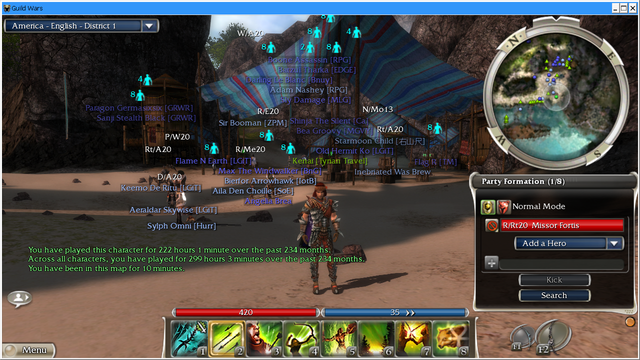2025-12-31 18:41:06
Israel on Tuesday said it had
💥suspended more than two dozen humanitarian organizations,
including "Doctors Without Borders" and CARE,
from operating in the Gaza Strip
for failing to comply with new registration rules.
Israel says the rules are aimed at preventing Hamas and other militant groups from infiltrating the aid organizations.
But the organizations say the rules are arbitrary and warned that the new ban would harm a civilian population d…
2025-11-30 23:12:46
I just finished Guild Wars: Prophecies. It took me 19.5 years.
I created my first character way back when the game was new, but I never finished the campaign. The upcoming Reforged update got me interested again. Together with a friend and 3 very friendly strangers we played through the remaining 3 missions.
From boss tactics to tounge-in-cheek comments about the dated cutscenes It was just the perfect MMO game night for me.
2025-12-30 23:38:33
Blocking the work of MSF is absolutely depraved. Israel continues to fumble its way out of the community of civilized nations.
https://apnews.com/article/gaza-israel-hamas-palestinians-ceasefire-war-news-286106d7a5a911704cdcf1c93…
2025-11-02 04:53:11
Heritage Foundation President Kevin Roberts
-- under fire for a video he posted defending Tucker Carlson for his friendly interview with white supremacist talker Nick Fuentes
-- has reassigned his chief of staff to another position.
In an email to the conservative think tank’s staff on Friday,
Roberts announced that Heritage’s executive vice president, Derrick Morgan, had been tapped to replace Ryan Neuhaus as chief of staff.
In the controversial video posted on X …
2025-12-01 18:39:38
I'm #ActuallyAutistic, and I love this woman deeply. I have been a huge fan of her music, especially my special interest in her song “Loin d’ici” (ESC Version) since May 14, 2016.
But now, watching Taylor Swift, Cœur de Pirate, and other artists slowly take her place feels like an unspoken farewell, like a song fading softly into the distance. It’s as if she herself is tell…
2025-11-29 14:30:55
Abuse in Buddhism: The Law of Silence https://openbuddhism.org/library/videos/2022/elodie-emery-wandrille-lanos-present-buddhism-the-unspeakable-truth/
2026-01-29 23:43:11
The "Board of Peace" was created as a result of the United Nations Security Council (UNSC) adoption of Resolution 2803 on November 17, 2025,
which authorized the organization as a “transitional administration with international legal personality”
intended to “set the framework and coordinate funding for the redevelopment of Gaza.”
However, the organizational charter revealed in Davos is light on details and makes no mention of Gaza.
This has caused many to…
2025-12-02 01:31:30
Alt5 Sigma accumulated $1.5 billion of World Liberty Financial cryptocurrency in August as part of a circular deal that routed more than an estimated $500 million to an entity affiliated with President Donald Trump
Public companies, like Alt5 Sigma, must notify the SEC within four business days when their independent accountant resigns, and their accountant must reviewany interim financial statements included in a quarterly report.
Alt5 Sigma told the SEC on Black Friday its indep…
2025-11-29 02:49:01
A college freshman trying to fly from Boston to Texas to surprise her family for Thanksgiving
was instead deported to Honduras
in violation of a court order, according to her attorney.
Any Lucia Lopez Belloza, 19,
had already passed through security at Boston Logan International Airport on Nov. 20
when she was told there was an issue with her boarding pass,
said attorney Todd Pomerleau.
The Babson College student was then detained by immigration off…
2025-11-29 18:53:27
Porn has long been a proving ground for new technology.
When Johannes Gutenberg invented the printing press in the 15th century it was quickly deployed to print bawdy pamphlets.
Adult films were put on video in 1977, a year before mainstream Hollywood ones,
and dominated sales for some time.
When Minitel, a French precursor to the internet, was launched in the early 1980s, erotic services initially accounted for between one-third and a half of all traffic.
I…








